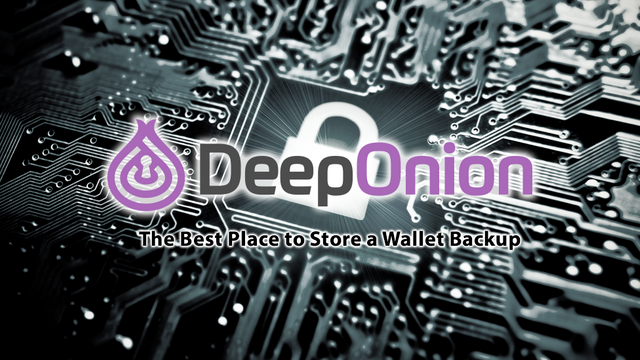DeepOnion - The Best Place to Store a Wallet Backup and Private Key
DeepOnion - The Best Place to Store a Wallet Backup
If you currently have DeepOnion's stored in your computer, I highly recommend you make a backup of your wallet and private key. You can backup your wallet by going to the File Menu > Click on (Backup Wallet). Once you saved your file, it will have a .dat file extension.
To backup your private key Go to the Help Menu > Debug Window > Go to the Console Tab. Towards the bottom, you will see the text input field. In this area you need to enter:
dumpprivkey WALLET ADDRESS
For example: dumpprivkey DZajPcp3YW2vzVhpeeEMVauBUFQ7pJxF9k
Be sure to copy the private key information into a text file and back it up on the encrypted drive as well.
The DeepOnion backup .dat file and the private key are the files we will be talking about in this article. Storing the backups in only your computer is not safe. If for any reason the hard drive gets corrupted, crashed, damaged and in some cases even stolen you will lose all of your DeepOnion currency.
The best place to store a wallet backup and private key is on several external hard drives. I currently use an IronKey S1000 and three Kanguru Defender 3000 FIPS 140-2 Level 3 USB's. These USB's are FIPS 140-2 Certified. FIPS stands for Federal Information Processing Standard (FIPS 140-2). In the United States, it is mandatory that any classified and important documents are stored only on a FIPS 140-2 hard drive. The FISMA law passed in 2002 also requires all Federal Government agencies to store data only on an encrypted hard drive.
These hard drives meet the strictest standards which make them the ultimate security drive. Safeguard your confidential data with 256-bit AES hardware-based encryption, in XTS mode. Both of the above usbs offer FIPS 140-2 Level 3 validation with on-device Cryptochip Encryption Key management.
They will require you to enter a password and without it will not be possible to access the data. If you were to lose your hard drive or if it was stolen, there would be no reason to worry about your private data being accessed by any third party.
I like to have some encrypted USB drives hidden at home and one in my banks safe-deposit box. Also well beyond just simple password protection, make sure the USB offers brute-force protection. Also, make sure it has a tamper-proof casing.
You can look at the USB's I recommended above or search for a trusted provider of FIPS encrypted external drives. One thing to note is that the above drives also have access to remote management software that enables you to completely wipe the hard drive by logging into a cloud-based server to remotely enforce password and access policies that will render the drive completely useless and wiped data free.
Now you have learned that keeping your wallet backup and private key in an external encrypted drive is the smartest choice. In another article, I will also explain how you can set up an offshore hosted private cloud server to store files that will automatically be encrypted with AES-256 by default. I firmly believe an external encrypted hard drive is the best option because a server can always be hacked, but what use would the files be if they are fully encrypted? I will go more into detail in my next article.

Nice article. I just backed up my wallet earlier tonight and dumped my private key to a usb per monkii's tutorial youtube. I will sleep much better tonight as my windows machine has been doing the equivalent of blue screen of death. We need to get the daily volume up on Nova.
Onion wallet: DsZ8NTBaSqEW9BDevFoKjHYhQ9F1LEQRr8